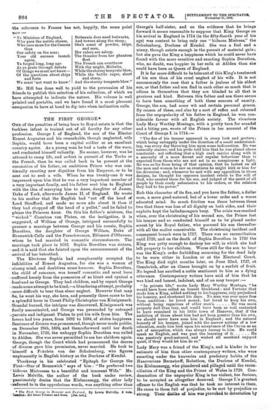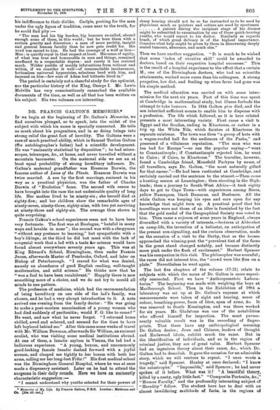THE FIRST GEORGE.* -ONE of the penalties of being born
toRoyal estate is that the luckless infant is trained out of all faculty for any other profession. George I. of England, the son of the Elector Ernest Augustus and his remarkable, though neglected, wife Sophia, would have been a capital soldier or an excellent -country squire. As a young man he had a taste of the wars, -and conducted himself valiantly. No sooner, however, was he --attuned to camp life, and ardent in pursuit of the Turks or the French, than he was called back to be present at the
• coronation of his father, an ambitious Prince who was con- - -tinually exacting new dignities from his Emperor, or to be sent out to seek a wife. When he was twenty-one it was impressed upon him that he was a very important member of very imPortant family, and his father sent him to England -with the idea of marrying him. to Anne, daughter of James, 'Duke of York, afterwards James II. of England. He wrote -to his mother that the English had "cut off the head of • -Lord Strafford, and made no more ado about it than if - they had chopped off the head of a Pullet," and be failed to
• -please the Princess Anne. On this his father's mistress, the
• -4" wicked" Countess von Platen, on the instigation, it is
• suggested, of William of Orange, intrigued successfully to —procure a marriage between George and his cousin, Sophia Dorothea, the daughter of George William, Duke of Brunswick-Celle and the Frenchwoman, Eleonore d'Olbreuse, - whom he had married in romantic circumstances. The marriage took place in 1682. Sophia Dorothea was sixteen, '-and it is Said that she fainted upon the announcement of the .--arrival of her betrothed.
The Electress Sophia had complacently accepted the infidelities of Ernest Augustus, for she was a woman of ,--strong mind, and doubtless some humour.. Sophia Dorothea, the child of romance, was herself romantic, and must have ,-.suffered keenly from the possession of so blunt and cynical a Atusband as George. They bad children, and by report George '.anade some attempt to be kind,—a blundering attempt, probably anore difficult to bear than sheer neglect. However that may .be, he went his way, she hent,.and presently there came to her splendid lover in Count Philip Christopher von Konigsmark. .Scandal buzzed, the intrigue was discovered, Kiinigsmark was foully assassinated, and George was persuaded by outraged -.parents and indignant Platen to put his wife from him. The lovers had two years, from 1692 to 1694, of stolen happiness. . Sentence of divorce was pronounced, though never made public, . on December 28th, 1694, and thenceforward until her death in November, 1726, the unhappy Sophia Dorothea was exiled to Ahlden. She was never permitted to see her children again. - George, though the Court which had pronounced the decree of divorce gave him permission, never married. He took to 'himself a Fraulein von der Schulenburg, who figures • unpleasantly in English history as the Duchess of Kendal. Thackemy in his celebrated "Epitaph for George the -Firet—Star.of Brunswick" says of him : "He preferred two 'hideous Mistresses to a beautiful and innocent Wife." Mr. - Lewis Melville, the author of the book under review, passionately denies that the Kielmansegg, the other lady ..referred to in the opprobrious words, was anything other than • The First George in Hanover and England. By Lewis Melville. 2 vols. --Landon: Sir Isaac Pitman and 8ona. [24a. net.] George's half-sister, and on the evidence that be brings forward it seems reasonable to suppose that King George on his arrival in England in 1714 (in the fifty-fourth year of his
age) was content to bring only one "hideous Mistress," the Schulenburg, Duchess of Kendal. She was a fool and a ninny, though astute enough in the pursuit of material gain; but she gave the King a happiness which he could never have found with the more sensitive and exacting Sophia Dorothea, who, no doubt, was happier in her exile at Ahlden than she could have been as Queen of England.
It is far more difficult to be tolerant of this King's treatment of his son than of his cruel neglect of his wife. It is not uncommonly the case that a father is jealous of his eldest son, or that father and son find in each other so much that is odious in themselves that they are blinded to all that is gracious and kind. Between this father and son there seems to have been something of both these sources of enmity.
George, the son, had some wit and certain personal graces. By reason of these, and also by a sort of reflex and rebound from the unpopularity of his father in. England, he won con- siderable favour with all English society. The vivacious Lady Mary Wortley Montagu, with a pretty turn for scandal
and a biting pen, wrote of the Prince in her account of the Court of George I. in 1714 :— " The fire of his temper appeared in every look and gesture ; which being unhappily under the direction of a small understand- ing, was every day throwing him upon some indiscretion. He was naturally sincere, and his pride told him that he was placed above constraint: not reflecting that a high rank carries along with it a necessity of a more decent and regular behaviour than is expected from those who are not set in so conspicuous a light. He was so far from being of that opinion, that he looked on all the men and women he saw as creatures he might kick or kiss for his diversion: and, whenever he met with any opposition in those designs, he thought his opposers insolent rebels to the will of God, who created them for his use, and judged of the merit of all people by their ready submission to his orders, or the relation they had to his power."
Rob this character of its fire, and you have the father, a duller man, a more good-natured, but of a lower order and a worse educated mind. So much friction was there between these
two that there was loss of all dignity on both sides, and their exploits kept the balladmongers busy. The crisis was reached
when, over the christening of his second son, the Prince lost his temper and so conducted himself as to be placed under arrest by his Royal father, who pursued his son thereafter with all the malice conceivable. The christening incident and consequent breach were in 1717. There was no reconciliation until 1720, and on the death of Sophia Dorothea in 1726 the
King was petty enough to destroy her will, in which she bad left property to her children. Worse still for the son to bear was the King's order forbidding mourning for the dead lady to be worn either in London or at the Electoral Court. The King died eight months later, on June 22nd, 1727, at
Osnabriick, after an illness brought on by a surfeit of fruit. No legend has ascribed a noble sentiment to him as a dying utterance. Contemporary writers have said of him that he was kind and honest, indolent, and of an easy temper :—
" In private life," wrote- Lady Mary Wortley Montagu, "ho would have been called an honest blockhead : and Fortune that made him a King, added nothing to his happiness, only prejudiced his honesty, and shortened his days. No man was ever more free from ambition : he loved money, but loved to keep his own, without being rapacious of other men's He was more properly dull than lazy, and would have been so well contented to have remained in his little town of Hanover, that if the ambition of those about him had not been greater than his own, we should never have seen him in England ; and the natural honesty of his temper, joined with the narrow notions of a low education, made him look upon his acceptance of the Crown as an act of usurpation, which was always uneasy to him. Be could speak no English, and was past the learning of it He was passively good-natured, and wished all mankind enjoyed quiet, if they would let him do so."
Lady Mary was a friend of the King's, and is kinder in her estimate of him than other contemporary writers, who were smarting under the knaveries and predatory habits of the Hanoverians Bernstorff, Robethon, the Duchess of Kendal, the Kieltuansegg, who plundered and pillaged until the recon- ciliation of the King and the Prince of Wales in 1720. Con- demnation of the unpopular King is too violent, too furious,
to be accepted as altogether deserved. George L's greatest
offence to the English was that he took no interest in them. He came to them full of prejudice, to be met by prejudice as strong. Their dislike of him was provoked to detestation by
his indifference to their dislike. Carlyle, probing for the man under the ugly figure of tradition, came near to the truth, for be could find pity':—
" The man had his big burden, big honours so-called, absurd enough some of them, in this world ; but he bore them with a certain gravity and discretion : a man of more probity, insight and general human faculty than he now gets credit for. His word was sacred to him. He had the courage of a wolf or lion— Man : is quietly royal in that respect at least. His sense of equity, of what was true and honourable in men and things, remained uneffaced to a respectable degree : and surely it has resisted much. Wilder puddle of muddy infatuations from without and within, if we consider it well—of irreconcilable ineoherences, bottomless universal hypocrisies, solecisms bred with him, and imposed on him—few sons of Adam had hitherto lived in."
• The period is certainly not a cheerful study for the optimist, nor the particular history of the King, George I. Mr. Lewis Melville has very conscientiously ransacked the available documents of the time, as well as all that has been written on his subject. His two volumes are interesting.

































































 Previous page
Previous page